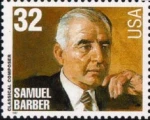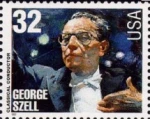 Do the Math has posted comments on the Barber Piano Concerto. While the piece is not exactly K. 466, I don’t think it is as problematic as Iverson makes it out to be. He talks about the opening of the third movement as great movie music, and I was reminded of sitting with Steve Jaffe at a performance of some relatively obscure Copland orchestral music. I whispered to Steve, “This sounds like movie music”. He corrected me, saying “No, movie music sounds like this.” I think the same applies to the Barber.
Do the Math has posted comments on the Barber Piano Concerto. While the piece is not exactly K. 466, I don’t think it is as problematic as Iverson makes it out to be. He talks about the opening of the third movement as great movie music, and I was reminded of sitting with Steve Jaffe at a performance of some relatively obscure Copland orchestral music. I whispered to Steve, “This sounds like movie music”. He corrected me, saying “No, movie music sounds like this.” I think the same applies to the Barber.
Iverson has no patience for the episode at fig. 18 of the concerto’s finale - I wonder how he feels about the passage in the Bartok Concerto for Orchestra to which this episode is indebted - it is right out of the “game of pairs” movement. Is that just as weak?
Barber is at once overrated and underrated. His easier songs and the piano sonata are relied upon by myriad college students needing to check off the “20th century”, or “English language”, or, Lord help us, “contemporary” box on their senior recital program - used so often you would think he was considered the greatest American composer. (At least this was the case when I was an undergrad - maybe that has changed. I doubt it.) But in another perspective, he is insufficiently appreciated by those who prefer an edgier idiom. You really shouldn’t dismiss the guy. Joe Straus does not; there is an interesting take on the slow movement of the piano sonata in his recent book on Twelve-Tone Music in America, and it is nice to see Barber in a book with Wolpe and Martino, among many others.
Ives, Carter, Crumb and Reich are more important composers than Barber. (Update: read the comments for a discussion of problems with that sentence.) But I certainly wish I had written “Sure on This Shining Night”, or “Knoxville”, or the Piano Sonata, or the Adagio (and not just for the royalties!) or even the Piano Concerto.
 A tale is told of Barber conferring with Szell after a rehearsal of the concerto. Barber was considering adding a whip* to the percussion in the third movement, and said to Szell, “make sure they bring the whip tomorrow.” Szell replied, “I don’t know, the orchestra didn’t play that badly.”
A tale is told of Barber conferring with Szell after a rehearsal of the concerto. Barber was considering adding a whip* to the percussion in the third movement, and said to Szell, “make sure they bring the whip tomorrow.” Szell replied, “I don’t know, the orchestra didn’t play that badly.”
*Also called a slapstick - two pieces of wood, hinged and struck sharply together - it is the sound at the beginning of the Ravel G Major concerto.
To your list of things I “wish I’d written” I would add the Violin Concerto and the Hermit Songs (especially the last one).
Dear Hayes,
Thanks for your note. I don’t really know the violin concerto, but I should have included the Hermit songs. Do you find the piano concerto as problematic as Ethan Iverson does? On re-listening, the third movement struck me as somewhat vulgar, but not lame.
I also wish I had written “Solitary Hotel”, and probably some other songs I am forgetting. Do you like “Dover Beach”?
I always liked the Piano Concerto, especially the slow movement (which I think he recycled once or twice, in arrangements for cello and piano or the like.) I never found the finale vulgar, though now that I think of it, it is admittedly a bit over the top in some ways. I grew up on the old John Browning recording with Cleveland, which of course was the only one for many years. (The flip side, as I recall, was William Schuman’s “A Song of Orpheus.”) For some reason that record found its way into the public library in Helena, AR, along with Steuermann playing Schoenberg, Gould playing the Schoenberg Concerto, an LP of Takemitsu’s works, Stravinsky’s recording of “The Rake’s Progress” from the 60s, Bernstein’s recording of “Falstaff” (with Fischer-Dieskau in the lead), and other unexpected items. So you see, my tastes got warped pretty early on. People I’ve known (even some who like Barber that you wouldn’t suspect would, like Andrew Mead) who criticize the Piano Concerto often do so on the grounds that he was straining too hard to be “modern,” but that concerto never seemed particularly forced in that way to me, nor does the piano sonata. I don’t know “Dover Beach” as well, but I remember liking it. I’m sure you must have heard the recording of Barber singing it. He had a rather nice voice. Do you know “Prayers of Kierkegaard”? It’s also worth a listen, I think. There’s a good recording that Robert Shaw did with Atlanta back in the 90s sometime (that disc also includes Bartók’s “Cantata Profana,” in Shaw’s English translation, and Vaughan Williams’ “Dona nobis pacem.”) I have also become quite fond of the First Symphony, which Slatkin does very well. I think that, for me, in many ways, the pinnacle is still “Knoxville.” One can quibble over a couple of things in the declamation/prosody (not many at all — “stertorous” is a pretty hard word to set, no matter how good you are), but I can’t imagine a more perfect way to set this text, and the last line, sung properly, is devastating.
I find it difficult to understand how someone can make a summary judgment about Samuel Barber, while admitting that he doesn’t know the Violin Concerto, which is clearly the most popular and most widely performed American violin concerto. There are only 48 works in Barber’s official canon, so knowing all his music is not such a daunting task. Nevertheless, not having done this, Primosch feels qualified to assert that Ives, Carter, Crumb, and Reich are more “important” composers. I have a real problem with statements like this, which leave the criteria for “importance” unstated. I can think of criteria that would support the contention that Barber is more “important” than any of them-number of pieces performed regularly by major orchestras and soloists, for starters.
You make some good points, Walter. The meaning of “important” is not clear, and to say one composer is more important than another is a vague assertion. Clearly Barber is very near the top of the list of American composers in terms of a presence in our concert halls.
What would be the other contenders for most “important” American violin concerti? Perhaps the Bernstein Serenade and the Adams Concerto, and I would guess that the Bernstein is played about as much as the Barber, no? What would be the fourth piece on such a list?
How much of a composers’ body of work must one know - and how deeply - before one is qualified to make judgements about that composer’s canonical status?
I think it is good to recognize that one may hold many canons to be valid, for there are many ways of defining “important”. Personal rankings - which may spring from criteria that are, from the outside, ill-formed - may not coincide with, so to speak, public rankings that might be based on quantitative criteria. Many criteria would place Barber is among the very top American composers. I love Barber, but then why do Ives, Crumb, Copland, and Ellington matter more to me than Barber? Sounds like a topic for another post.
Thank you for reading, and for your worthwhile comment.
Well, many interesting points are raised here. First of all, “important” has the ring of an objective statement, while “matter more to me” is clearly subjective. I think that those two types of assertion need to be distinguished from each other. I have no argument with you if Ives, Crumb et al. matter more to you than Barber. We are all entitled to our favorites. But to use a term like “important”-and without citing criteria-sounds like an attempt to give “objective” weight to a personal preference. As for your question of how deeply must one know a composer’s canon before one is qualified to attempt an objective judgment of that composer’s stature, I would say that one must know all that composer’s major works, and a smattering of his minor works. And one must know enough about the composer to know which are the major works. That’s my opinion, and the standard to which I try to hold myself. But personal preferences are a different story. If I hear three or four pieces by composer X and I don’t like any of them, I am entitled to say I don’t like what I’ve heard, and have no interest in hearing any more. But that is a very different level of judgment.
Walter, would you care to comment on what it means to “know” a work? Repeated listenings? score study? performance?
I’ll try to address some of the issues you raise in a future post.
“Knowing” a work is not an either/or situation: It’s a process that-to me-begins with hearing, continues with multiple hearings, and can be further enhanced by score study and performance. Familiarity with the rest of a composer’s output also contributes to “knowing” a particular work. But I think what you’re driving at is: When does one “know” a work well enough to make judgments. Again, it’s a continuum, and one might add that the less thoroughly one “knows,” the more humility is in order, when issuing judgments.